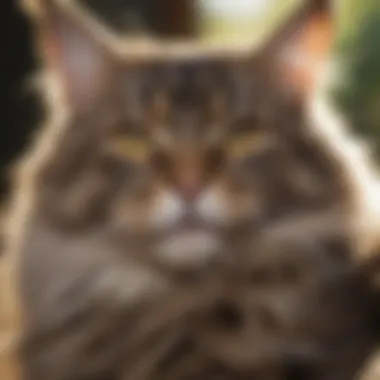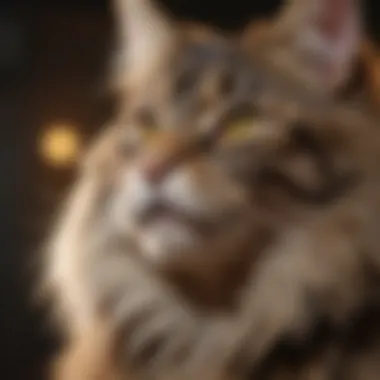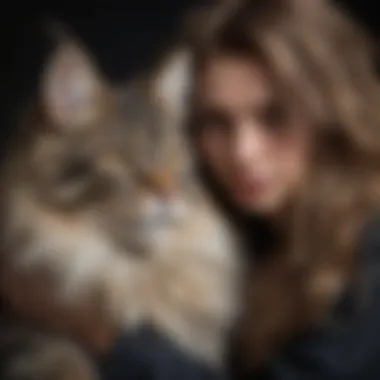Understanding the Costs of Owning a Maine Coon Cat


Intro
Owning a Maine Coon cat requires careful consideration regarding financial aspects. This breed stands out for its large size and friendly disposition, making it a popular choice among pet owners. However, potential owners must be aware of both initial costs and ongoing expenses associated with this majestic feline.
Understanding the price range of a Maine Coon cat is essential for making an informed decision. Prices can fluctuate based on the cat's lineage, geographic location, and whether one is adopting or purchasing. The commitment extends beyond the initial purchase, encompassing various ongoing costs such as food, grooming, and veterinary care.
By examining all aspects related to the costs of a Maine Coon, one can grasp the long-term financial obligations that accompany this breed. Below, we will explore the pertinent details in a structured manner.
Prelude to Maine Coon Cats
Maine Coon cats are one of the most popular breeds among cat enthusiasts, notable for their large size and friendly nature. Understanding the unique aspects of this breed is crucial for prospective owners. This section aims to provide insights into both the origin and history of Maine Coons, as well as their distinct physical characteristics. By delving into these areas, readers will gain a deeper appreciation for what it means to own a Maine Coon cat.
Origin and History
Maine Coons have a rich history that traces back to the northeastern United States, specifically the state of Maine. These cats are believed to have evolved as natural hunters. The breed's name likely comes from a blend of their geographic origins and the raccoon-like tail, which is an obvious feature. Although folklore abounds regarding their beginnings, genetic studies suggest that they are a mix of domestic cats brought over by sailors and possibly long-haired breeds from Europe. Their adaptability to cold climates and independence has made them a beloved part of American culture.
Physical Characteristics
Maine Coons are easily distinguishable by their large stature and tufted ears. Males typically weigh between 13 to 18 pounds, while females are somewhat smaller, averaging between 8 to 12 pounds. Their long, shaggy fur, which can come in various colors and patterns, is not only beautiful but also practical for insulation. Unlike many other breeds, Maine Coons possess a unique bone structure that contributes to their muscular build.
Some key physical features include:
- Long, bushy tails: These serve not just for balance but also for warmth, as the cat can wrap its tail around its body in cold weather.
- Large, expressive eyes: Their eyes come in various colors, often matching their coat.
- Lynx-like tufted ears: These tufts add to their distinctive appearance and are thought to aid in hearing.
The Maine Coon's friendly demeanor and adaptability make it a great companion for families and individuals alike.
Factors Influencing Price
The price of a Maine Coon cat is not solely determined by the initial purchasing price but also by various factors that play significant roles in the overall cost. Understanding these elements will help prospective owners make informed decisions when selecting a Maine Coon. Factors influencing the price include breeder reputation, bloodline and pedigree, and location. Each of these factors can add both direct and indirect costs to your eventual purchase. By considering these factors, one can gauge whether the investment aligns with their budget and expectations.
Breeder Reputation
Breeder reputation is a critical variable when assessing the cost of a Maine Coon cat. Established breeders with a history of quality are more likely to charge higher prices. These breeders often adhere to ethical practices such as health testing and socializing kittens, ensuring they are well-integrated into family life. High-quality breeders might also provide guarantees on the health of their kittens, which adds value.
Choosing to purchase from a reputable breeder can prevent potential health issues that arise from unethical breeding practices. Health problems can incur further financial costs down the line, leading to a lower quality of life for your pet. Therefore, investing in a recognized breeder can save time and money while also ensuring a happy and healthy addition to your family.
Bloodline and Pedigree
Bloodline and pedigree are significant aspects when evaluating the cost of Maine Coons. Renowned bloodlines often come with a higher price tag due to their proven lineage and family traits. Cats that come from championship or show-quality backgrounds may be priced significantly higher than those without prestigious ancestry.
Here are some considerations regarding bloodline:
- Show Quality: Cats bred specifically for show purposes have aesthetic qualities that meet breed standards and are oftentimes more expensive.
- Genetic Traits: Some traits associated with well-known lines can increase desirability. This includes desirable colorations or physical characteristics that align with breed standards.
Purchasing a cat with a strong pedigree can be a long-term investment. Higher priced cats generally offer quality that reflects their lineage.
Location
The geographic location from which you buy a Maine Coon can also affect pricing. In urban areas, costs may be inflated due to higher living expenses for breeders, while rural locations may offer lower prices due to reduced overhead. However, prospective owners must also consider travel costs to acquire a cat from a far-away breeder.
Factors to keep in mind about location include:


- Market Demand: Some regions have a higher demand for Maine Coons, leading to increased prices.
- Local Regulations: Certain areas may have laws regarding pet ownership which could include registration fees that impact overall costs.
- Transport Expenses: If you find a desirable breeder far away, the cost of transportation should also be factored into the total price.
Ultimately, understanding these factors will aid in making a wise purchase decision. Paying attention to breeder reputation, bloodline, and location can ensure you are equipped with the knowledge needed to choose the right Maine Coon within your budget.
Average Purchasing Costs
Understanding the average purchasing costs of a Maine Coon cat is vital for potential owners. It serves as a baseline for budgeting and helps in making an informed decision. Owning a pet requires consideration not just of the immediate costs, but also the ongoing expenses they incur as time goes on. Knowing the average price can inform your choice of breed and where you get your pet.
Market Price Range
The market price range for Maine Coon cats typically falls between $800 to $2,000. Factors that influence this range include the cat's age, breed quality, and geographical location. Generally, you can find kittens on the lower side of the spectrum, whereas adult cats, especially those with pedigree documentation, tend to cost more.
When looking for a Maine Coon, it’s essential to research breeders or sellers closely. Prices can fluctuate based on demand and availability in your area, and being well-informed will help ensure you are making a sound investment.
Variations in Pricing
Standard Maine Coons
Standard Maine Coons represent the most common type you will encounter. These cats are typically bred for companionship rather than showing or breeding. Their prices can range from $800 to $1,200. This pricing can be considered beneficial as it allows many individuals to adopt this charming breed without excessive financial strain. The key characteristic of standard Maine Coons is their friendly and adaptable nature, making them suitable for families. While they do not possess the prestigious lineage of show-quality cats, they provide excellent companionship, which aligns with many people's pet ownership goals.
Show Quality Maine Coons
Show quality Maine Coons are distinguished by their conformation to breed standards defined by cat show organizations. These cats tend to be more expensive, often costing between $1,300 to $2,000. Their higher price is justified through their outstanding physical appearance and pedigree. Show quality Maine Coons typically showcase features like a well-balanced body, thick fur, and distinctive ear tufts. While they command higher fees, owning one can be seen as an investment in superior breeding stock. One downside is that they may require more specialized care, including grooming and show preparations, which could add to overall costs.
Rare Color Varieties
Rare color varieties of Maine Coons captivate many enthusiasts. Prices for these cats can range from $1,200 to $3,000, depending on the rarity of the color. Breeders often charge a premium for these unique hues. The unique feature of these cats lies in their striking colors and patterns, making them visually distinct. While popular among collectors and breeders looking to expand their lines, prospective owners must consider if the aesthetic appeal outweighs the high financial commitment. Realistically, the primary disadvantage may relate to their limited availability, which could require extensive research and patience before finding a suitable cat.
Additional Initial Costs
Understanding the various initial costs associated with bringing a Maine Coon cat into your home is essential for any prospective owner. These expenses extend beyond the purchase price of the cat. They include necessary healthcare measures, the decision to spay or neuter, and the basic setup of your new feline companion's environment. Being aware of these costs can help ensure that you are fully prepared for responsible cat ownership.
Vaccinations and Vet Check-ups
When welcoming a Maine Coon into your life, initial vaccinations and vet check-ups are crucial steps. Vaccinations protect against severe diseases such as feline distemper and rabies. The cost of vaccinations can vary, but it typically ranges from $75 to $150, depending on the veterinary clinic and specific vaccines required.
Regular veterinary check-ups are vital, especially in the first year. These visits can catch potential health issues early, contributing to your cat's longevity. Routine exams may add an additional $50 to $100 per visit. Particularly for a Maine Coon, which can be prone to heart conditions, establishing a good relationship with a veterinarian can prove invaluable.
Spaying or Neutering
Spaying or neutering your Maine Coon is a vital consideration. These procedures help prevent unwanted litters, behavioral issues, and certain health problems. Generally, the cost for spaying a female Maine Coon can range from $100 to $300, while neutering a male typically costs between $50 and $150.
While some owners hesitate due to cost, it's important to recognize the long-term financial and health benefits associated with these procedures. They not only help control the pet population but can also lead to lower veterinary costs in the future.
Supplies and Setup
Equipping your home to accommodate a Maine Coon involves various supplies that may require a substantial initial investment. Ensuring a safe and comforting environment is paramount for your cat’s adaptation and well-being.
Food and Water Bowls
Selecting the right food and water bowls is key for your cat's health. Stainless steel bowls are a beneficial choice due to their durability and ease of cleaning, which helps prevent bacteria growth. Opting for elevated bowls can also aid in digestion, particularly for larger breeds like Maine Coons. The initial price for a good pair of stainless steel bowls can range from $20 to $50.


Litter Box Essentials
A clean litter box is essential for a cat’s comfort. Choosing the right litter is important and can significantly affect your Maine Coon’s litter training success. Clumping litter is popular for its efficiency, although some owners prefer biodegradable options. Initial costs for a litter box and essentials such as litter scoops can lie between $30 and $70.
Sleeping Area
Creating a designated sleeping area contributes to a comfortable home environment for your Maine Coon. Large, cushioned beds are characteristic for this breed, as they enjoy lounging. The initial investment for a quality cat bed can range from $25 to $75. Additionally, consider positioning it in a quiet, warm area to encourage restful sleep.
Investing in these initial costs will contribute significantly to your Maine Coon's health and happiness.
Understanding these additional initial costs provides a clearer view of what to expect financially when bringing a Maine Coon cat into your home. Proper planning will help create a nurturing environment for both you and your new companion.
Ongoing Costs
When considering a Maine Coon cat, ongoing costs are crucial for potential owners to understand. Unlike initial purchase costs, ongoing expenses can significantly impact long-term budgeting. These recurring costs include food, routine veterinary care, and grooming needs. Comprehending these elements is vital to ensure that your furry companion remains healthy and well cared for throughout its life.
Food Expenses
Food is a primary expense for any pet, including Maine Coons. These cats are large and have a hearty appetite. A typical Maine Coon might consume between 2 to 4 cups of high-quality cat food daily. This depends on their age, weight, and activity level.
Investing in premium brands like Royal Canin or Blue Buffalo can ensure they receive essential nutrients, thus supporting their overall health. The cost of cat food can range from $30 to $100 per month. It is beneficial to plan for this kind of expense, as proper nutrition can prevent more serious health issues down the line.
Routine Veterinary Care
Regular veterinary check-ups are essential for maintaining the health of your Maine Coon. These visits not only help in early detection of potential health issues but also ensure that vaccinations are up to date. The average cost for routine vet visits can be around $150 to $300 per year.
Some specific healthcare plans may include vaccinations, dental care, and preventative treatments for parasites. An important consideration is the cost of unexpected health issues, which can add a financial burden to your budget. Therefore, setting aside funds for veterinary emergencies is wise.
Grooming Needs
Maine Coons have long fur that requires regular grooming to prevent matting. This brings additional costs into play. An effective grooming routine can keep their coat in good condition, reduce shedding, and minimize the need for extensive veterinary care due to skin problems.
Frequency of Grooming
The frequency of grooming for Maine Coons typically should be at least once a week. This helps to remove loose hair and dirt from their coat, preventing matting. By grooming frequently, owners can maintain a healthy coat and reduce the amount of fur shed throughout the home. Weekly grooming can be an enjoyable bonding activity between the owner and the cat.
Professional Grooming Services
While regular grooming at home is recommended, some owners may opt for professional grooming services, especially during molting seasons. Professional groomers have the expertise to handle difficult mats and can also provide nail trimming and bathing, which can be challenging for some pet owners.
Hiring a professional may cost between $50 and $100, depending on the services rendered. This option can save time and effort, improving the overall health of the cat, but consider integrating this choice into your budget if you prefer this convenience.
The Adoption Route
The option of adopting a Maine Coon cat holds significant relevance in the overall discussion of costs associated with this breed. The decision to adopt can greatly influence not only financial aspects but also the well-being of the animals involved. Adoption promotes the idea of giving a home to cats that may otherwise be left in shelters or rescue organizations. It enables potential owners to engage with the emotional and ethical dimensions of pet ownership, adding layers of understanding and commitment beyond mere transactional relationships.
Adoption Fees
When considering adoption, it is important to be aware of the fees involved. Typically, adoption fees for Maine Coon cats are considerably lower than purchasing from breeders. These fees usually cover initial veterinary care, vaccinations, and spay or neuter services.
- Average adoption fees for a Maine Coon can range from $100 to $300.
- Some organizations may waive fees during special events to encourage adoption.
- The fee can vary based on the age of the cat; kittens might be more costly than senior cats.


These costs, while certainly present, present themselves as a much more affordable option compared to initial purchasing costs, making adoption a viable route for many potential pet owners.
Rescue Organizations
Various rescue organizations specialize in helping Maine Coon cats find their forever homes. These organizations are crucial in addressing the population of stray or abandoned cats. They often work carefully to ensure that each cat is well taken care of before it is adopted. Some noteworthy rescue organizations include:
- Maine Coon Rescue: Focuses solely on rescuing and rehoming Maine Coons, providing extensive background checks before placing a cat.
- Paws for a Cause: Works with various breeds, including Maine Coons, focusing on rehabilitation and placement.
- Local animal shelters: Many shelters end up with Maine Coons or mixes, and they often need support in adoption efforts.
Connecting with these organizations typically involves filling out an application and possibly going through an interview process. This ensures that the cats are being placed in suitable environments, which is a vital part of the adoption process.
Considerations for Adoptive Owners
Adopting a Maine Coon cat requires careful thought and responsibility. Prospective owners should consider the following aspects:
- Lifestyle Compatibility: Maine Coons thrive in environments where they receive companionship and adequate space to play. Each owner's lifestyle must align with these needs to ensure a successful adoption.
- Medical History: Many rescue organizations provide a thorough medical history, which is useful for future care. Understanding any pre-existing health conditions can help estimate future veterinary costs.
- Long-term Commitment: The projected lifespan of a Maine Coon can reach up to 15 years or more, making it a significant long-term commitment.
By weighing these considerations, potential owners can make more informed decisions about adopting a Maine Coon cat. Ultimately, choosing adoption is not only a cost-effective method but an impactful way to address the challenges faced by cats in need.
Long-Term Financial Commitment
Owning a Maine Coon cat extends beyond the initial purchase price; it represents a significant long-term financial commitment. Understanding this commitment is essential for potential owners. Unlike other pets, Maine Coons have unique needs that can accumulate over time. Proper budgeting from the start can prevent unexpected financial strain. It is not just about paying for food and visits to the veterinarian. While those costs can be anticipated, long-term care expenses can escalate based on the health and lifespan of the cat.
Projected Lifespan Costs
Maine Coons may live up to 12 to 15 years, and during this timeframe, various expenses must be considered. The age of the cat will impact the amount spent; younger cats may require more vaccinations and preventive care.
Key projected lifespan costs include:
- Food: As one of the largest domestic cat breeds, Maine Coons require a substantial amount of quality food. Expect to spend between $40 to $100 monthly, depending on the quality.
- Routine Vet Care: Regular check-ups are critical. These appointments can total $100 to $300 or more annually, depending on the services provided, such as vaccinations or dental care.
- Preventive Medications: Regular flea and tick treatments are important and can add another $15 per month.
- Grooming: Since Maine Coons have long hair, grooming is essential. You might need to invest in professional grooming services, which can range from $40 to $100 every few months.
Emergency Medical Situations
Even with proper care, health situations can arise unexpectedly. It is crucial to set aside funds for emergency medical situations, which can be particularly costly. As a cat ages, the likelihood of health issues increases. Common illnesses for Maine Coons might include hypertrophic cardiomyopathy, hip dysplasia, or other genetic conditions.
Costs associated with emergency care can vary widely:
- Emergency vet visits can cost from $150 to over $500 depending on severity.
- Surgical procedures may start at $1,000 and escalate significantly based on the procedure’s complexity.
Long-term financial planning becomes critical when considering these potential scenarios. It is advisable to budget for an emergency fund that could cover at least $1,000 to $3,000.
Proper understanding of financial responsibility ensures a better quality of life for both the Maine Coon and its owner.
Ultimately, recognizing the ongoing and emergency costs associated with a Maine Coon cat leads to more informed and responsible ownership. Prepare accordingly to embrace the rewarding experience that this magnificent breed offers.
Ending
The discussion of owning a Maine Coon cat culminates in a thoughtful consideration of the financial obligations affixed to this majestic breed. Understanding these costs is crucial for current and prospective cat owners, as it prepares them for the comprehensive commitment involved. It is not merely about the initial purchase price; it encompasses the entire lifecycle of the cat, influencing how one manages budgeting over years.
Summary of Costs
In brief, the overall costs related to a Maine Coon consist of several key areas:
- Purchase Price: Generally, the initial price can range widely depending on the cat's lineage and breeding background.
- Initial Expenses: This includes vaccinations, spaying or neutering, and setup costs such as food bowls and litter boxes.
- Ongoing Expenses: Routine care and maintenance are significant. Monthly food costs, routine veterinary visits, and grooming forms a major part of this.
- Emergency Funds: Preparing for unexpected veterinary emergencies is essential.
These categories piece together the financial picture, emphasizing the need for a diligent approach to budgeting. Owners must remain vigilant about these varying costs to ensure they can provide a stable and loving environment for their pet.
Final Thoughts on Owning a Maine Coon Cat
Owning a Maine Coon cat brings considerable joy but also necessitates informed decision-making. The breed is known for its playful nature and intelligence. However, its care demands both time and resources. Future owners should weigh their commitment to this breed against the offered benefits. Investing in a Maine Coon is investing in companionship and love, but it also requires a realistic evaluation of ongoing expenses.















